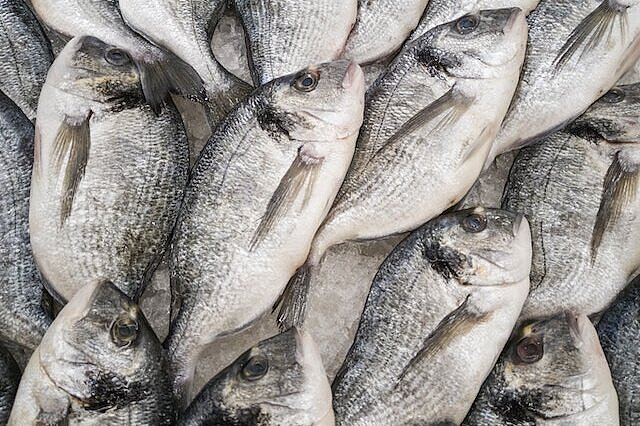Protein

Protein is an important nutrient for dogs that fulfills many functions in the body. It is the building block for muscles, skin, hair, immune system, metabolism, cell growth and repair. Without enough protein, your dog cannot stay healthy and fit.
But how much protein does your dog need? Which protein sources are good for him? And are there any risks if you feed him too much or too little protein? In this article, you'll find out everything you need to know about protein for dogs.
What is protein?
Protein is an organic compound consisting of amino acids. There are 20 different amino acids that can be combined in various ways to form proteins. The dog's body can produce some amino acids itself, while others must be obtained from food. These are called essential amino acids.
There are both plant and animal protein sources for dogs. Animal proteins are usually easier to digest and contain all the essential amino acids that dogs need. Plant proteins are often less digestible and need to be combined with other plant or animal proteins to provide a complete amino acid profile.
How much protein does your dog need?
Your dog's protein requirements depend on various factors, such as their age, size, activity level and health status. As a general rule, puppies need more protein than adult dogs to grow and develop. Small dogs need more protein per kilogram of body weight than large dogs because they have a higher metabolism. Active or athletic dogs need more protein than calm or older dogs to maintain and regenerate their muscles.
You can calculate the exact amount of protein your dog needs each day from the information on the food label. The European Union guidelines recommend a minimum daily dose of 10% protein by weight of the daily ration for adult dogs and 22% for puppies. This means that if you feed your dog 200 g of dry food, it should contain at least 20 g of protein (44 g for puppies).
What are the benefits of protein for your dog?
Protein has many benefits for your dog's health and well-being. Here are some of them:
- Protein boosts your dog's immune system and helps them fight off illness.
- Protein promotes muscle growth and muscle regeneration in your dog, especially after physical exertion or injury.
- Protein supports your dog's metabolism and helps him to produce and use energy.
- Protein improves the quality of your dog's skin and coat and protects it from skin problems and hair loss.
- Protein ensures healthy cell growth and rapid cell repair for your dog, which is important for his organs, bones and joints.
What are the disadvantages of protein for your dog?
Protein usually has no disadvantages for your dog as long as you give him a high-quality and balanced diet. However, in some cases there may be problems if you feed him too much or too little protein or if he has an intolerance or allergy to certain proteins.
Here are some possible disadvantages of protein for your dog:
- Too much protein can put a strain on your dog's kidneys, especially if he already has kidney disease. The kidneys have to excrete the excess protein, which leads to increased urine production and thirst. This can lead to dehydration and urinary stones.
- Too little protein can break down your dog's muscles, leading to weakness and fatigue. It can also affect his immune system, metabolism and cell function. This can lead to infections, weight loss and organ failure.
- An intolerance or allergy to certain proteins can lead to digestive problems, skin rashes, itching, ear infections or breathing problems. The most common allergenic proteins for dogs are beef, chicken, dairy products, wheat and soy.
How can you feed your dog the right protein?
To feed your dog the right protein, you should follow a few tips:
- Choose a high quality food that has a good source of protein as its main ingredient. This could be lamb, turkey, fish or insects, for example. Avoid food that contains inferior or unclear protein sources such as meat meal, animal by-products or plant by-products.
- Pay attention to the digestibility and biological value of the protein in the food. These are key figures that describe how well the dog's body can utilize the protein. Animal proteins usually have a higher digestibility and biological value than vegetable proteins.
- Take your dog's individual protein requirements into account. Adjust the amount of food and protein to your dog's age, size, activity level and state of health. Follow the feeding recommendations on the food label or ask your vet for advice.
- Watch your dog for signs of intolerance or allergy to certain proteins. If you suspect that your dog is reacting to a particular protein, you can give him a hypoallergenic food that contains only one source of protein. This is called an elimination diet. If the symptoms improve, you can gradually introduce other proteins to find out which one is causing the problem.
Protein is an important nutrient for dogs that has many benefits for their health and well-being. It is important that you feed your dog a high quality and balanced diet that meets their individual protein requirements. Pay attention to the quality, digestibility and biological value of the protein sources in the food and monitor your dog for possible intolerances or allergies to certain proteins.
Properties 4
Are you looking for other ingredients with a specific property?
Just click on them to find more.
If you notice any signs of hypersensitivity or poisoning in your dog, you should see your vet immediately. We are not a substitute for a vet, but we try to be as accurate as possible. Every dog reacts differently and we recommend you get a second opinion or consult your vet if in doubt.
Stay healthy and take good care of your four-legged friend!😊
Similar to Protein
Duck protein is, as the name suggests, a protein obtained from the meat of ducks. It is a high-quality source of protein for dogs that contains many essential amino acids. Amino acids are the...
Fish protein is a concentrate from the muscle meat of fish, which is produced using various processes such as drying, extraction or hydrolysis. Unwanted components such as water, fat, bones or...
Poultry protein is a collective term for protein obtained from various parts of poultry animals such as chickens, turkeys or ducks. It can consist of muscle meat, offal, bones or a mixture of all of...
Hydrolyzed protein is protein that has been partially broken down. This means that the long protein chains have been broken down into smaller units called peptides. This is done by a chemical or...



